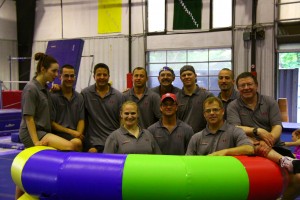This post is a little over due. It was started when I had just returned from Gym Momentum Camp in NY where we had a great group of kids and coaches. The Gym Momentum staff we had this year were-
- Ivan Ivanov
- Rick McCharles
- John Wojczuk
- Brock Freehling
- Rebecca Sykes
- Carly Meyer
- Daire Oceallag
- Matt Yellis
- James Parent
- Rob Murray
- and me- Tony Retrosi
One of the things I love about camps is getting together with other coaches in a social setting. Typically all conversations lead back to the gym. What we are doing with a particular group that is working and what isn’t working. Hoping for some help from some of the other coaches. This year we seemed to get a little bogged down with coaches looking for quicker ways. In the end- There are no shortcuts, crash programs or quick fixes that will get you there faster. You will always have to pay the piper whether it is sooner or later. It is better to pay up front by being very thorough in the development process with a balanced program that builds a solid foundation. All components of fitness must be trained at all times of the training year and the career, just the proportion and emphasis changes with advancing training age and proficiency. At younger training ages, especially during periods of rapid growth and development it is tempting to try to accelerate the process, because they can but they will pay for it later on. My concern today is that young athletes over compete and under prepare in terms of sound fundamental training. They can continue to advance on talent and competitiveness and then the roof caves in either with serous injuries, performance stagnation or performance decrement. Pay the piper, take care of fundamentals heed the wisdom of the body and train appropriate for the athlete’s level of development. Rome was not built in a day; training accumulates day-to-day, week-to-week, month-to-month and year-to-year. Take time and do it and teach it right the first time.
It is a given that to achieve any level of success in gymnastics demands hard work. That being said ANYONE can work hard. Champions are the ones who work smart. They know how to balance the work in order to get full benefit from the time and effort in training. Some gymnasts and coaches make the choice to try to go hard all the time with the HOPE that they will survive. It is just that hope. And hope does not win medals. In reality more often than not it is this athlete who is seldom there when it counts the most. They either get hurt or spend all their time managing nagging injuries that keep them from achieving results. The alternative is to train smart, understand their capabilities and recoverability so that they can thrive and be at their best when the stakes are highest. Smart training balances the hard with the easy, it takes into account individual differences and allows for differing adaptation times to different training demands. To train smart listen to your gymnasts and have them listen to their body. Follow what it is telling you. Training accumulates over time so recognize that you are in it for the long term.
To be a Good and effective coach – it demands a careful blend of art AND science. It is not an either or proposition. Modern coaching necessitates that the coach have a sound foundation in sports science which means the coach is educated in sports science, but is not a sport scientist (I leave it up to Dr. Sands and Dr. George!) You can learn the science in school or by reading, you can’t really learn to coach in a classroom, online or in a book. You must get out and practice coaching. Coaching is something YOU ARE not something you do. Day to day coaching demands artistry to achieve results. In today’s world, with the stress on science and technology it is too easy to forget the art and focus on the science. The words of Bill Sweetenham from the Global Coaching House last summer in London sum it all up quite nicely: “ Science is only useful if it makes the coach a better artist.”





